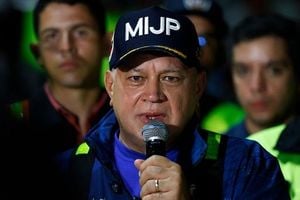On October 7, 2025, Attorney General Pam Bondi found herself at the center of a heated Senate Judiciary Committee hearing, fielding questions that cut to the heart of a controversy involving Tom Homan, President Donald Trump’s so-called border czar. The issue: a $50,000 cash payment Homan allegedly accepted from undercover FBI agents posing as businessmen in a sting operation set up during the summer of 2024. The investigation, which began months before Trump’s return to office, was abruptly closed when he was sworn in again in January 2025. Yet the questions—and suspicions—have only grown louder since.
According to MSNBC and Raw Story, the sting was launched after investigators received a tip that Homan was soliciting bribes ahead of Trump’s re-election. The operation was classic cloak-and-dagger: FBI agents, posing as business executives, offered Homan a bag containing $50,000 in cash, allegedly in exchange for help obtaining lucrative government contracts in the new administration. What happened next, and what became of the money, remains shrouded in mystery—a mystery that dominated the Senate hearing this week.
Senator Sheldon Whitehouse (D-R.I.) pressed Bondi for answers. “What became of the $50,000 in cash the FBI delivered in a paper bag to Homan?” he asked. Bondi, who was not yet attorney general when the investigation was closed, repeatedly deflected. “As Deputy Attorney General Todd Blanche recently stated, [Homan] was subjected to full investigation by the FBI and found no credible evidence of any wrongdoing,” she said, according to MSNBC. But that wasn’t enough for Whitehouse, who insisted on a clear answer about the fate of the money. Bondi ultimately told him he’d have to direct his questions to FBI Director Kash Patel.
The tension in the room was palpable, and it only escalated as the hearing continued. Senator Adam Schiff (D-Calif.) zeroed in on conflicting public statements about the alleged bribe. White House press secretary Karoline Leavitt had categorically denied that Homan took the money, telling reporters the claim was false and urging them to “get your facts straight.” But when Schiff asked Bondi directly, “Was that true, what the White House press secretary said when she denied Homan took the money? Did he take the money?” Bondi responded with visible frustration: “Sen. Schiff, that happened prior to my confirmation. All I know is that Deputy Attorney General Todd Blanche and FBI Director Patel said there...was...no...case. And Karoline Leavitt is one of the most trustworthy human beings I know.”
The drama didn’t stop there. Senator Peter Welch (D-Vt.) asked Bondi if there was a tape documenting the exchange of the $50,000. Bondi replied, “I don’t know the answer,” prompting Welch to press her further. The exchange quickly became combative, with Bondi accusing Welch of implying she was lying. Welch clarified, “I didn’t call you a liar,” but the damage was done. The hearing had become a showcase for the deep frustration and suspicion swirling around the case.
In a joint statement released in September 2025, Deputy Attorney General Todd Blanche and FBI Director Kash Patel sought to put the matter to rest: “This matter originated under the previous administration and was subjected to a full review by FBI agents and Justice Department prosecutors. They found no credible evidence of any criminal wrongdoing. The Department’s resources must remain focused on real threats to the American people, not baseless investigations. As a result, the investigation has been closed.”
But not everyone is convinced. Mark Lee Greenblatt, a former government watchdog who served as inspector general at the Interior Department under Trump, penned an op-ed for The New York Times on October 10, 2025, dissecting what he sees as multiple red flags in the investigation and its abrupt closure. Greenblatt, who was fired when Trump returned to office, didn’t mince words. “The first red flag is apparent enough: Mr. Homan and the White House gave inconsistent responses to the allegations,” he wrote. “Karoline Leavitt, the White House press secretary, told reporters that Mr. Homan never took the money—a flat, categorical denial. Mr. Homan has said only that he did nothing wrong and nothing illegal. Notice the difference.”
Greenblatt’s point is a sharp one: if Homan truly never accepted the money, why not just say so? “Why fall back on a narrow denial about wrongdoing or illegality? Whose account is more credible?” he asked in his New York Times piece. The lack of a direct denial from Homan, contrasted with the White House’s unequivocal statement, has fueled speculation and distrust.
Greenblatt also raised serious concerns about the security clearance process. “When Mr. Trump took office, Mr. Homan was under F.B.I. investigation for bribery. And yet he went on to serve as a senior White House official, likely with a high security clearance. How did that happen?” he wrote. According to Greenblatt, obtaining such a clearance is supposed to be a rigorous process, especially for senior officials. “Investigators are supposed to scrutinize an applicant’s background, finances and potential vulnerabilities to influence. An active federal investigation for bribery should set off alarm bells, at the very least.”
He suggested there are only two explanations—neither of them comforting. Either those responsible for vetting Homan’s clearance knew about the allegations and deemed them irrelevant, or no security evaluation was conducted at all. “Both possibilities are extremely troubling,” Greenblatt argued. “Either the security clearance process failed in spectacular fashion or there’s a dangerous gap in the system designed to protect sensitive government information.”
The third and perhaps most surprising red flag, in Greenblatt’s view, involves tax law. “It may sound absurd, but it is the law,” he wrote. “If Mr. Homan did in fact accept a $50,000 payment, did he report it as income on his taxes? If not, that omission could conceivably constitute tax crime, a serious federal offense in its own right. Just ask Al Capone.” Greenblatt questioned whether the Justice Department and FBI ever examined the potential for tax violations as part of their inquiry—and if not, why not?
The swirl of unanswered questions and conflicting statements has left lawmakers, watchdogs, and the public with little closure. The official line from the Justice Department is that the case is closed and no credible evidence of wrongdoing was found. Yet the lack of transparency about the fate of the $50,000, the inconsistent denials, and the apparent gaps in the security clearance process have only deepened suspicions for many.
As the dust settles, one thing is clear: the Tom Homan bribery probe has exposed cracks in the nation’s systems for accountability and oversight at the highest levels. Whether those cracks will be repaired—or simply papered over—remains to be seen.



